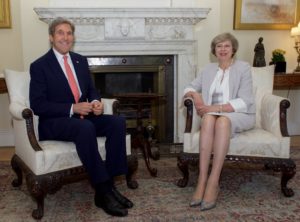May Defends Britain’s Refugee Policies at United Nations
British Prime Minister Theresa May, addressing a United Nations meeting on September 19, implored world leaders to alleviate the recent stresses of uncontrolled global human migration. Alluding to the sense of chaos that has, in her opinion, characterized the refugee policies of many countries, May argued for the right of individual states to control their borders and implement sovereign immigration policies.

May proposed three critical directives in her speech. First, in an effort to reduce the transitory nature of refugees, states should work with refugees to help them gain asylum. Second, states should better distinguish between economic migrants and conflict-driven refugees and tailor their public policies appropriately. Finally, in what seemed to be the focus of her address, May asserted the responsibility of all states to enforce their borders and mitigate uncontrolled human migration.
Prime Minister May’s remarks were not met without criticism, even from within the British government. Speaking to BBC, Labour MP Yvette Cooper criticized May’s government for neglecting its responsibility to resettle refugees, especially children, and instead focusing too heavily on border controls. In a statement published by The Guardian, Cooper stated, “Alongside border controls, we also need safe, legal routes to sanctuary, including speeding up family reunion, which is far too slow and mired in bureaucracy.” As the head of the Labour Party’s refugee taskforce, Cooper has been especially critical of May’s decision to address the root causes of conflict-driven migration rather than focusing on refugee resettlement in Britain.
European Commission spokesman Margaritas Shinas also denounced May’s remarks, telling the EU Observer that “relocation obligations are enshrined in European law.” His statement reflected the sentiments of many European Union leaders who believe that its 28 member states have a legal, moral, and shared obligation to assist refugees from the Middle East and elsewhere.
